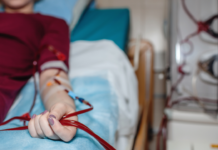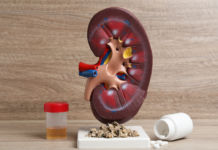Sponsored by: Renadyl™
Thousands of patients each day undergo kidney dialysis treatment across the United States. These patients are at an increased risk for infection because the hemodialysis process requires frequent use of catheters or needles to access the bloodstream. Patients who undergo hemodialysis have weakened immune systems, which increase their risk for infection. They require frequent hospitalizations and surgery where they might acquire an infection.
An infection can feel like the flu.
If a dialysis patient access gets infected, it can feel like a terrible flu with fever, chills, nausea, vomiting, and body aches. The infection may prevent patients from even receiving treatment through their access. An infection can even require a lengthy hospital stay to get better.
Can germs get into your body through your access?
Dialysis accesses are designed to make it easy for blood to get into and out of your body for dialysis treatments. Unfortunately, this also makes it very easy for germs to get into your body. An infection occurs when germs get into your body and multiply. Regrettably, nearly 1 in 10 people on dialysis will get an infection during the year.
What prevention can I take to from getting an infection?
The most important thing a patient can do to prevent infection through their access is proper hand hygiene. Patients should wash their hands for 30 seconds before touching near your access. It takes 30 seconds of washing to get rid of all the germs on your hands.
Infection prevention will vary depending on your access.
- Catheter- Patients with hemodialysis catheters are at a much higher risk of infection than those with a permanent access—germs like wet, warm, dark, and dirty places. If a catheter bandage gets wet or dirty, it can become a breeding place for germs to hide and multiply. Inform your dialysis care team immediately if you have a catheter and the bandage becomes wet or dirty.
- Fistula/Graft- Patients with a fistula or graft could get an infection if the area near or around the access has germs. Germs are everywhere, and any surface you touch with your hands or body carries germs. If you touch a surface with your access, wash it for at least 30 seconds with an antibacterial soap as soon as possible. Patients should always wash their access just before their dialysis treatment and then again after dialysis.
Patients should report any signs of redness, swelling, or pus near their access or if they get a fever, chills, or nausea to the dialysis team or kidney doctor. It is always safer to report any symptoms than to ignore them.
Learn more about our sponsor Renadyl™ here https://bit.ly/3sZDWbb
About the author
Steven Belcher, RN, MSN, MS, is a dedicated kidney advocate who began his journey 20 years ago as a dialysis nurse. This job inspired him to help as many people with kidney disease as he could. Not only did he spend two decades caring for a patient’s physical and emotional needs in a clinical setting, but he also educated the public on the risk factors of kidney disease. Some of his many philanthropic successes include being a keynote speaker at the National Association of Nephrology Technicians/ Technologists (NANT), presenting at community spaces, and launching radio shows.
He now focuses his time entirely on his organization Urban Kidney Alliance, which educates the public about kidney disease. His goal? To lower rates of Chronic Kidney Disease in urban communities in Baltimore, Maryland, across the country, and globally through education and collaboration.
Steve has also written the book “HOW TO SURVIVE OUTPATIENT HEMODIALYSIS: A GUIDE FOR PATIENTS WITH KIDNEY FAILURE.” You can read the book review here.
*These statements have not been evaluated by the US Food and Drug Administration. This information is not intended to diagnose, treat, cure, or prevent any disease. Always consult with a qualified healthcare professional prior to beginning any diet or exercise program or taking any dietary supplement. The content on our website is for informational and educational purposes only.




